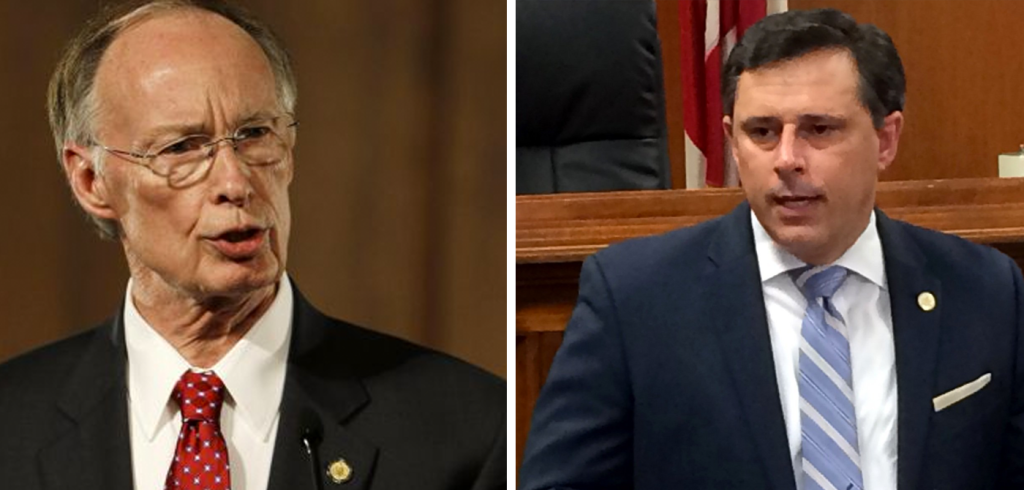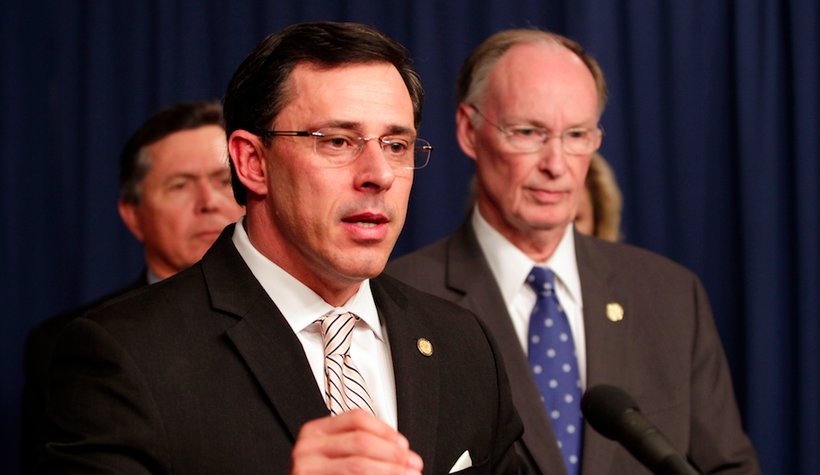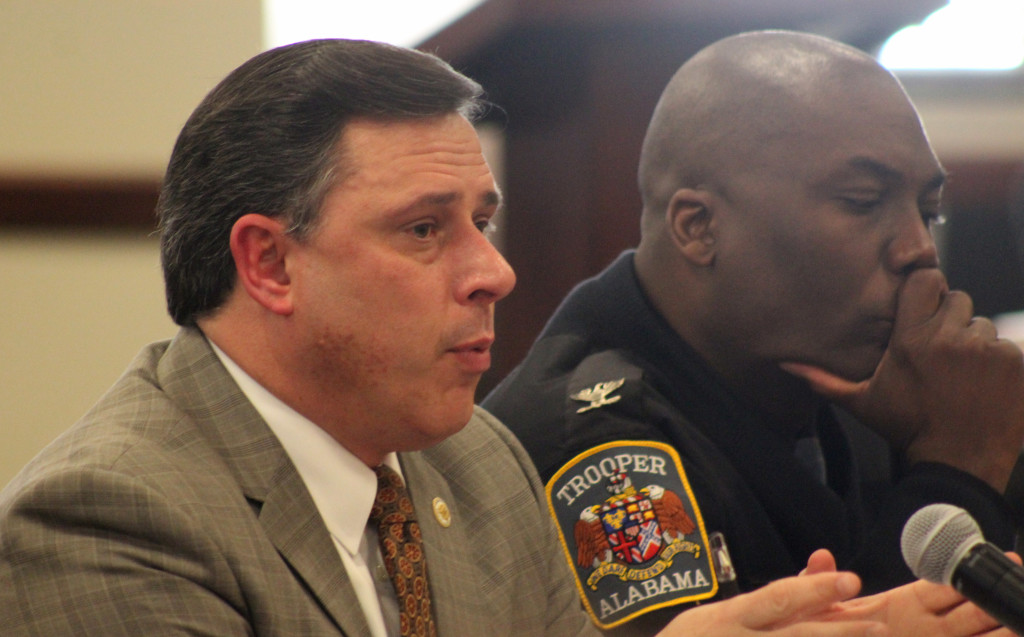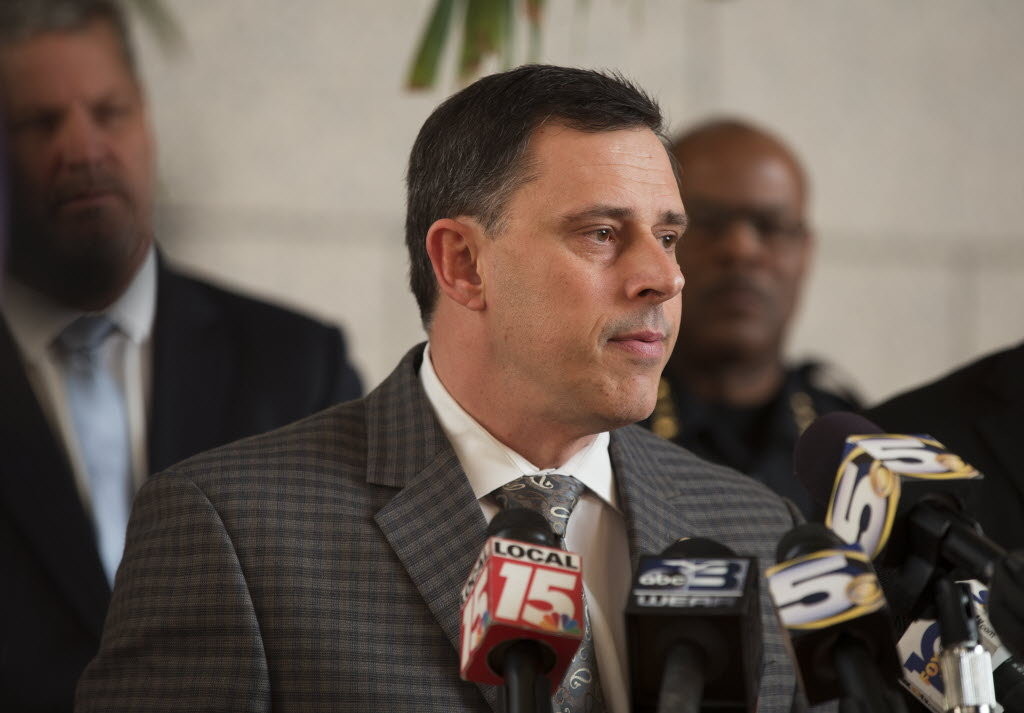Former ALEA Secretary adds defendants to termination lawsuit

Spencer Collier, the former secretary of the Alabama Law Enforcement Agency (ALEA) has amended his wrongful termination lawsuit against Governor Robert Bentley and others. Filed on Wednesday, the complaint names an attorney for ALEA Michael Robinson and ALEA special agent April Bickhaus as two new defendants. Five new counts are also listed in the complaint. The amended documents claim Robinson and Bickhaus were part of an effort to smear Collier. The five new counts are as follows: Count X accuses Bentley, Rebekah Mason, Stan Stabler and Robinson of conspiracy, alleging that they worked together to place Collier “in a false light and to falsely accuse him of crimes and other misconduct,” damaging his reputation in order to discredit his testimony as a potential witness against Bentley and others. Count XI is an invasion of privacy claim that states the false information and statements published were done so to intentionally hurt Collier and invade his privacy. The lawsuit says the statements were “made and published with malice and with knowledge and intent to hurt and discredit Collier.” It further says “Bentley grossly abused his position and committed Ethics Violations by using State equipment, facilities, time, materials, human labor, and other public property for his private benefit and personal desires to hurt Collier and damage his reputation.” Count XII claims Robinson used his job to “intimidate and coerce ALEA employees to make false and derogatory statements against Collier.” Count XIII accuses Bickhaus of an invasion of privacy. The lawsuit states that she “invaded Collier’s privacy by putting him in a false light and position in the eyes of the public by among other things, placing false and disparaging information in the ALEA Reports.” The claim also states that Bickhaus knew there was no “legitimate” purpose for the investigation. Count XIV accuses Bentley and his staff members, “at [the governor’s] direction”, of publicly accusing Collier of committing crimes, while knowing the accusations were false. View the amended suit below:
Robert Bentley turns over ALEA report criticizing Spencer Collier for absenteeism, spending

Gov. Robert Bentley turned over a 1,600-page filing with a committee looking into his impeachment last week, which included a 63-page report criticizing former Alabama Law Enforcement Agency (ALEA) director Spencer Collier‘s job performance, offering new insights into his March 2016 firing. The report was the product of a months-long investigation by April Bickhaus, a special agent with ALEA’s Integrity Unit, which she began in February 2015. It includes quotes from ALEA employees and paints a picture of habitual absenteeism, a misuse of state funds and mismanagement in the office, and poor hiring decisions. It also included allegations of sexual harassment, prescription drug abuse, and falsifying time sheets. Among its findings, the report claims upon review of entry records, Collier’s key card was used to access the ALEA’s Montgomery headquarters only 20 days in the six-month period before his termination. It also indicated a problem with the amount of weapons Collier purchased, and the process in which he did so. “Weapons stand out to us because this particular individual bought a lot of weapons, more than the average employee,” the report quotes ALEA Accounting Director Jennifer Frost having said. “For him to just go to Gulf States (Distributors) and buy weapons and accessories without a (purchase order), and purchase these items through the ALEA account held at Gulf States is clearly wrong.” Collier, who said allegations Bentley used state funds to pursue an affair with former senior aide Rebekah Caldwell Mason led to his investigation, denies the charges made against him in the report. “This is probably the sleaziest politics that I have ever seen,” Collier said in a statement. “One witness in this report has recanted and others will. Stan Stabler and Michael Robinson threatened employees, lied to them and intimidated them to say whatever was needed to fit the narrative.” Read the entire ALEA report below:
Robert Bentley awards $3.7 million to improve Labor Day, holiday highway safety

Gov. Robert Bentley on Thursday awarded nearly $3.7 million to help keep Alabama roads safe during the upcoming Labor Day weekend and other major traveling holidays during the next year. Funds will be used by law enforcement agencies throughout the state to maintain a presence on highways including setting up checkpoints, increasing patrols on heavily traveled roads, and providing traffic monitoring. “I am proud to award these funds to increase safety on all of Alabama’s more than 100,000 miles of roadways,” Gov. Bentley said. “Highway safety is a very important part of our overall efforts to increase public safety. By increasing the number of troopers and police on the roads, we look to increase driver awareness and adherence to our traffic safety laws.” Bentley awarded $1.2 million to the Alabama Law Enforcement Agency to keep more troopers on the road during heavy traffic times. The remaining funds will be distributed among the four traffic safety offices in the state, which allocate funds to local police and sheriff’s departments for use in their jurisdictions. Allocations to each office are as follows: North central region: $686,577 East central region: $669,581 Southwest region: $604,631 Southeast region: $536,127 The funds also help support major traffic safety campaigns like “Click it or Ticket” and “Drive Sober or Get Pulled Over.” The Drive Sober campaign is now in full swing through Labor Day, with the aim of reducing highway injuries and deaths caused by impaired driving due to drugs or alcohol, and distracted driving. Funds were made available to the state from the National Highway Traffic Safety Administration and are being administered by the Alabama Department of Economic and Community Affairs (ADECA). “This program puts the funds into the hands of state and local law enforcement agencies who know exactly where patrols and police presence need to be,” ADECA Director Jim Byard Jr. said. “ADECA is pleased to partner with law enforcement across our state in this effort to reduce deaths and injuries on our state’s roads.”
State to pay lawyers up to $200,000 in lawsuit against Robert Bentley

The state will pay outside legal counsel up to $200,000 to represent Gov. Robert Bentley and his law enforcement chief in a wrongful termination lawsuit brought by the governor’s fired secretary of law enforcement. The legislative Contract Review Committee will review the contracts Thursday. The governor’s office has proposed to pay a private law firm up to $100,000 to represent Bentley. The Alabama Law Enforcement Agency will pay up to $100,000 to represent Law Enforcement Secretary Stan Stabler. Former Secretary Spencer Collier in April filed a wrongful dismissal lawsuit against Bentley, Stabler and former Bentley adviser Rebekah Mason. Bentley has said Collier’s dismissal came after an internal investigation about the possible misuse of state funds. Collier accused Bentley and Mason of having an affair. Bentley denied having a “sexual affair.” Republished with permission of the Associated Press.
Feds question Spencer Collier in Robert Bentley scandal

The former law enforcement chief who accused Alabama Gov. Robert Bentley of having an affair with an adviser has been questioned by federal investigators about the governor’s administration, the official’s attorney said Wednesday. Kenny Mendelsohn, who represents former state law enforcement secretary Spencer Collier, would not elaborate on what questions investigators asked. A person close to the administration who also was questioned told The Associated Press FBI agents asked about the use of state grants and other resources. The person spoke on condition of anonymity, fearing retribution. The revelations are the latest sign of trouble for Bentley, who has been the subject of an impeachment push since he admitted making inappropriate comments to the former aide, Rebekah Caldwell Mason. He has denied having an affair with her. A spokeswoman for the governor declined to comment. The AP obtained a letter written by an aide to U.S. Attorney George Beck in Montgomery saying Beck has stepped aside from any possible investigation or prosecution involving the governor’s office. The subject line on the letter, dated last week, states: “Re: Grand Jury Investigation.” However, it is not clear if a grand jury has been empaneled, which could be a sign of a deepening investigation. Beck said Justice Department officials in Washington decided to remove the case from his office, and he is unsure of its status since then. “The office of general counsel makes those decisions when they think it’s in the best interest of the public that if a U.S. attorney’s office is too close to a situation then it’s best to recuse that U.S. attorney us and the entire office,” he said. FBI Director James Comey, in Birmingham for an event about civil rights, declined comment on any federal probe involving Bentley. The impeachment effort began after Collier, the former head of the Alabama Law Enforcement Agency fired by Bentley, accused his former boss and friend of having an affair with a staffer and of interfering with law enforcement business. Bentley acknowledged making inappropriate remarks to Mason but denied the other accusations. However, audio recordings obtained by the AP purportedly captured the governor — before his wife of 50 years divorced him last year – telling a woman he loved her and enjoyed kissing and fondling her. Collier has since sued Bentley for wrongful termination, accusing Bentley of firing him because the two disagreed over a request to file an affidavit saying investigators found no evidence of misconduct by prosecutors in the ethics case against House Speaker Mike Hubbard, who is now on trial in Lee County. Collier said he wanted to file the affidavit, but the governor didn’t want him to. Collier said that Bentley asked him to lie to prosecutors, and that he was unwilling to do that. Bentley asked a judge to throw out the lawsuit earlier this week. — Associated Press writers Kim Chandler in Opelika, Alabama, and Phillip Lucas in Birmingham contributed to this report. Republished with the permission of The Associated Press
Audit calls into question Robert Bentley’s stated reason for firing head ALEA officer

An audit by the Alabama Examiners of Public Accounts released last month, which found no “significant instances of noncompliance with applicable laws and regulations” within the Alabama Law Enforcement Agency (ALEA), calls into question Gov. Robert Bentley‘s stated reason for firing the agency’s former director Spencer Collier. The audit, first reported by WBRC, covered six years from Oct. 1, 2009 to Sept. 30, 2015, which includes all but four months of Collier’s leadership of the agency. The audit is a notable discrepancy to the governor’s stated reason for booting Collier earlier this week. “(Collier’s replacement, Stan Stabler) identified several areas of concern in the operations, policies and procedures at ALEA,” Bentley said in a news release Tuesday announcing Collier’s dismissal. “After an internal review, the ALEA Integrity Unit found a number of issues, including possible misuse of state funds. I am disappointed to learn these facts, and today, I relieved Spencer Collier of his duties as ALEA Secretary.” Collier, during his news conference Wednesday, which set off the firestorm of allegations about the governor’s personal life, claims he only learned about his dismissal and the governor’s stated reason through social media. Stabler has acted in the capacity of ALEA director since Collier was placed on medical leave in February. In addition to having made the claims about misuse of money in the agency under Collier’s watch, Stabler also maintains he was not a witness to any evidence of the governor’s alleged affair, as was stated by Collier. “The allegation and implication from Mr. Collier is completely false and without merit,” Stabler wrote in a statement. Attempts to contact a spokesman from the Examiners of Public Accounts’ office to ascertain whether the department has plans to conduct more audits of ALEA were unsuccessful. Another audit could determine whether there was any misuse of funds between the end of the agency’s scheduled audit on Sept. 30, 2015, and Collier being placed on medical leave in February. Attorney General Luther Strange said Thursday afternoon his office “takes very seriously any allegations involving potential criminal misconduct,” and, “has a strong record of probing illegal activity in this state and we will continue to do our job,” but his office will not release any further information about “pending criminal investigations.”
Robert Bentley terminates Spencer Collier as head of Alabama Law Enforcement Agency

Following reports from multiple news agencies that an internal investigation had uncovered a possible misuse of funds in the Alabama Law Enforcement Agency, Gov. Robert Bentley announced the termination of ALEA Secretary Spencer Collier Tuesday. According to a statement from Bentley’s office, Collier was placed on medical leave a few weeks ago to recover from back surgery. It was during that time that Acting Secretary Stan Stabler uncovered “several areas of concern in the operations, policies and procedures at ALEA.” An internal review by the ALEA Integrity Unit discovered the possible misuse of state funds, though further details are scarce at this time. “Spencer Collier and I have served together a long time, dating back to my time in the Alabama House of Representatives,” Bentley said in a press release. “He is a friend of mine, and led the implementation of the consolidation of state law enforcement functions into one singular agency, the Alabama Law Enforcement Agency (ALEA). I appreciate Spencer’s service to the State of Alabama.” Collier contends that he has done nothing wrong and believes an outside investigation by the Attorney General’s office will prove that. Stabler has been appointed to the top spot in the department effective immediately. Since the announcement of Collier’s termination, he has accused the governor of instructing him to lie to the Attorney General’s office in regard to the ongoing corruption scandal surrounding House Speaker Mike Hubbard (R-Auburn). Bentley asserts that such allegations are unfounded.
Bill would require driver’s license offices open 2 days weekly

Lawmakers in Alabama are considering a bill that would require the Alabama Law Enforcement Agency (ALEA) to open driver’s license offices at least two days a week in every county. More than 30 offices were closed last year by budget cuts, though most were reopened after public outcry. Concern was raised that the closings would limit people’s access to identification required for voting, as well as the ability to attain driver’s license. SB172 from Sen. Hank Sanders (D-Selma) garnered a unanimous favorable report from members of the Senate Committee on General Fund Finance and Taxation, despite some noting that the bill needed revisions. Sanders’ legislation is slated to go before the Senate soon. ALEA estimates that the cost of opening the offices for additional days will cost $1.35 million annually. In January, ALEA Secretary Spencer Collier told legislators in budget hearings that his department needed an additional $23 million in funding to remain operational. ALEA did not respond to multiple requests for comment on the impact of the legislation.
ALEA requests $23 million more for 2016

The Alabama Law Enforcement Agency (ALEA) is requesting an additional $23 million in funding from the state’s General Fund for the 2016 fiscal year. ALEA, founded on Jan. 1 last year, is the combination of a variety of previously unique law enforcement agencies, including state troopers, marine police, and homeland security. ALEA has been allocated $44 million from the state’s beleaguered general fund, a decrease of about $20 million from what the agencies were accustomed to receiving before being combined under the ALEA headline. ALEA Secretary Spencer Collier attributed the request for additional money to a variety of reasons, including the need to hire more troopers. According to Collier, ALEA has 420 troopers. A recent study found Alabama should have about 1,100 troopers on its roadways, and compared to other states, Collier called Alabama’s numbers “abysmal” and “embarrassing.” Because Alabama is facing another year with an estimated $200 million shortfall in the General Fund, legislators grilled Collier on how the agency could cut costs. Suggestions included the increased use of local sheriff’s to handle local accidents and the extension of driver’s licenses from four- to five-year coverage. In its first year as a unified law enforcement agency, ALEA issued more than 380,000 tickets, handled more than 30,000 vehicular accidents, ran 27 surveillance operations and handled 146 manhunts.
State taking action to ensure voter readiness in Alabama

With 2016 just around the corner, Alabama Secretary of State John Merrill is teaming with the state Legislature to ensure Alabamians are prepared to fulfill their civic duty and vote. Together they have coordinated voter registration drives across the Yellowhammer state, where Merrill’s office will also issue photo I.D.s that are necessary to vote in the state. The issuance of photo I.D.s are of particular note to Alabamians as the Alabama Law Enforcement Agency (ALEA) announced its plans to close 31 driver license offices because of a significant loss of funding in the new state budget on Sept. 30, drawing nationwide criticism. In 2014, only 41 percent – 1.17 million of about 2.9 million – of Alabama’s registered voters turned out for the general election, the lowest participation in a general election since in at least 28 years. The upcoming voter readiness events will be held on: Saturday in Covington County at 8 a.m. at the Opp Fest Saturday in Pike County at 10 a.m. at the Peanut Butter Festival, Saturday in Jefferson County at 9 a.m. at the Magic City Classic Tuesday in Shelby County at 10 a.m. at the Roy Downs Memorial Library Wednesday in Lee County at 10 a.m. at the Smiths Station City Hall Since June 3, 2014, to participate in an election, a citizen must be registered to vote and present a valid form of photo ID. Forms of photo ID accepted at the polls are any of the following valid documents: driver’s license; Alabama photo voter ID card; state issued ID (any state); federal issued ID; US passport; employee ID from Federal Government, State of Alabama, County, Municipality, Board, or other entity of this state; student or employee ID from a public or private college or university in the State of Alabama (including postgraduate technical or professional schools); Military ID; or Tribal ID. To receive a free Alabama photo voter ID card, a citizen must be a registered voter and must not have one of the valid forms of photo ID listed above. For information on the site schedule as well as free Alabama voter identification cards, visit www.alabamavoterid.com or call 1-800-274-VOTE.
Crime rate down 5 percent in Alabama during 2014

A newly released report by the Alabama Law Enforcement Agency’s (ALEA) Information Bureau shows the crime rate down statewide in 2014. Looking at crime statistics in the 2014 “Crime in Alabama” annual report, there were 164,516 reported crimes in 2014 — more than a 5 percent decrease from 2013. That’s an average of 451 reported crimes a day, making this the third consecutive year for a decrease. Across the spectrum of categories analyzed crimes were down: homicides down 21 percent; property crimes down 5 percent; burglaries down 7 percent; robberies down 1 percent; and crimes involving motor vehicles down 5 percent. The complete 161-page publication takes an in-depth look at reported crimes from 350 law enforcement agencies. “Each year, our Information Bureau uses the Uniform Crime Reporting (UCR) Program to analyze individual crime statistics reported by 350 local law enforcement agencies across Alabama. ‘Crime in Alabama’ is a publication containing an official statistical analysis of crime in these local jurisdictions throughout Alabama during the previous year,” said Alabama Law Enforcement Agency’s Chief Information Officer Kevin Wright. Also released were detailed supplemental reports for the 350 local law enforcement agencies, excerpted from the “Crime in Alabama” 2014 report. Those supplements include the 2014 “Domestic Violence in Alabama,” the 2014 “Juvenile Victims of Violent Crime in Alabama,” and the 2014 “Drug-related Crime Statistics in Alabama.” Alabama’s UCR Program, administered by ALEA’s Information Bureau, provides uniform crime rate statistics that are submitted to the the Federal Bureau of Investigation (FBI) or its annual publication of crime statistics. You can view the Crime in Alabama 2014 report in its entirety and the supplemental reports here.
Greg Albritton: Don’t punish rural Alabama because of waste in Montgomery

All too often, the professional bureaucrats in Montgomery ignore the people of rural Alabama. The recent closure of driver’s license offices in our rural counties across the state is just another example of these Montgomery bureaucrats sticking it to rural folks. On October 1st, the Alabama Law Enforcement Agency (ALEA) – an agency the Legislature created several years ago to consolidate the Department of Public Safety and other law enforcement functions – announced the closure of thirty-one driver’s license offices, many of which are in our rural counties such as Washington and Escambia. ALEA has said the closures were necessary because its funding was cut by $11 million. It is true that the state budget passed a couple of weeks ago cut ALEA’s funding. In fact, this compromise budget required most state agencies to trim costs by 1% to 5%. These small cuts were necessary to keep government growth under control. However, in ALEA’s case there are no reductions in available funds for 2016. In February of this year, ALEA, on its own claimed authority, initiated an increase of $12.75 on each and every driver’s license renewal in the state. This fee increase results in an estimated annual take from the citizens of Alabama of $12.7 million in additional funds. This increase goes directly to ALEA, not to the General Fund budget. Hence, the Legislature’s General Fund budget reduced funding to ALEA by $11 million, on the principle that the taxpayers were now burdened with an additional tax by this (independent) bureaucracy. So ALEA will have $1.7 million available in additional funds for 2016. But even if this were not the case, the budget passed by the Legislature required that all reductions due to funding cuts were to occur first in the bloated bureaucracies of Montgomery. Why did the Legislature put this restraining language in the budget? Because Governor Bentley and others have repeatedly used fear-mongering rhetoric to describe the effect cuts would have on state services as they tried to build support for a $541 million (or whatever the chosen figure) tax hike. After the Legislature passed the General Fund budget, Governor Bentley actually praised the budget and promptly signed it into law. Soon after signing though, the Governor reversed himself and argued that the restraining language in the budget was unconstitutional. He asked Alabama’s Supreme Court to weigh in on the matter, but the Court declined. I am disappointed that Governor Bentley has used, and continues to use, state agencies as part of his political push for higher taxes on the people of Alabama. I am frustrated that ALEA has chosen to close thirty-one driver’s license offices in rural counties across the state, even though ALEA has a net increase of $1.7 million. To solve an artificial problem that Governor Bentley has created and ALEA has exacerbated, I have written and will submit a bill in the 2016 legislative session that requires ALEA to provide driver’s license testing in every county in Alabama on a monthly basis. But my real hope is that ALEA will reverse its decision in the intervening time and reopen the thirty-one crucial, rural driver’s license offices. The citizens of rural Alabama deserve the same state services as people living in Mobile, Birmingham, Tuscaloosa, or Montgomery. I hope that Governor Bentley will stop using state agencies to advance his political agenda and will work with the Legislature for the good of the entire state. Senator Greg Albritton represents Senate District 22, which is comprised of all or parts of Choctaw, Clarke, Washington, Monroe, Mobile, Conecuh, Escambia, and Baldwin counties, in the Alabama Senate.


